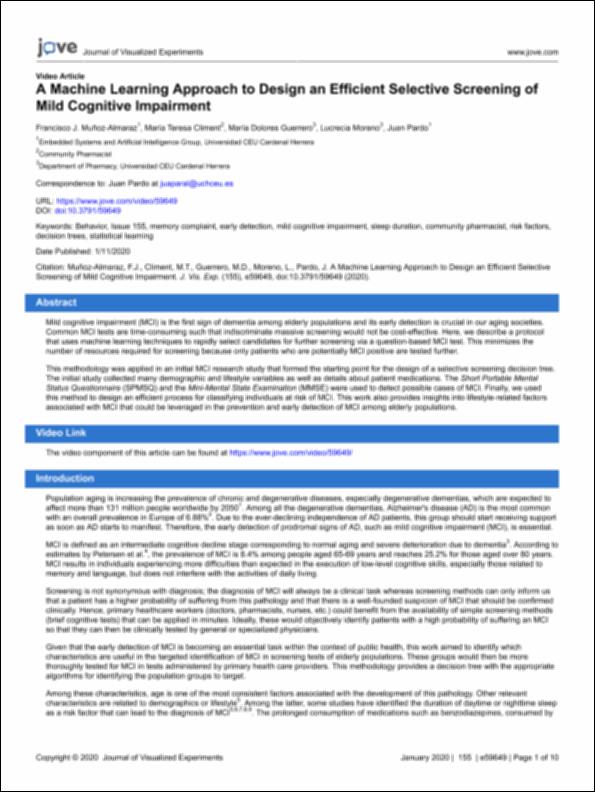Please use this identifier to cite or link to this item:
http://hdl.handle.net/10637/13935A machine learning approach to design an efficient selective screening of mild cognitive impairment
| Title: | A machine learning approach to design an efficient selective screening of mild cognitive impairment |
| Authors : | Muñoz Almaraz, Francisco Javier Climent Catalá, María Teresa Guerrero Masiá, María Dolores Moreno Royo, Lucrecia Pardo Albiach, Juan |
| Keywords: | Sistema nervioso - Degeneración - Diagnóstico - Modelos matemáticos.; System nervous - Degeneration - Diagnosis - Mathematical models.; Sistema nervioso - Enfermedades - Diagnóstico - Modelos matemáticos.; Nervous system - Diseases - Diagnosis - Mathematical models. |
| Publisher: | MyJoVE Corporation |
| Citation: | Muñoz-Almaraz, F. J., Climent, M. T., Guerrero, M. D., Moreno, L. & Pardo, J. (2020). A machine learning approach to design an efficient selective screening of mild cognitive impairment. Journal of Visualized Experiments (JoVE), i. 155, art. e59649 (11 jan.). DOI: https://doi.org/10.3791/59649 |
| Abstract: | Mild cognitive impairment (MCI) is the first sign of dementia among elderly populations and its early detection is crucial in our aging societies. Common MCI tests are time-consuming such that indiscriminate massive screening would not be cost-effective. Here, we describe a protocol that uses machine learning techniques to rapidly select candidates for further screening via a question-based MCI test. This minimizes the number of resources required for screening because only patients who are potentially MCI positive are tested further. This methodology was applied in an initial MCI research study that formed the starting point for the design of a selective screening decision tree. The initial study collected many demographic and lifestyle variables as well as details about patient medications. The Short Portable Mental Status Questionnaire (SPMSQ) and the Mini-Mental State Examination (MMSE) were used to detect possible cases of MCI. Finally, we used this method to design an efficient process for classifying individuals at risk of MCI. This work also provides insights into lifestyle-related factors associated with MCI that could be leveraged in the prevention and early detection of MCI among elderly populations. |
| Description: | Este artículo se encuentra disponible en la siguiente URL: https://www.jove.com/es/t/59649/a-machine-learning-approach-to-design-an-efficient-selective |
| URI: | http://hdl.handle.net/10637/13935 |
| Rights : | http://creativecommons.org/licenses/by-nc-nd/4.0/deed.es |
| ISSN: | 1940-087X (Electrónico) |
| Issue Date: | 11-Jan-2020 |
| Center : | Universidad Cardenal Herrera-CEU |
| Appears in Collections: | Dpto. Matemáticas, Física y Ciencias Tecnológicas |
Items in DSpace are protected by copyright, with all rights reserved, unless otherwise indicated.


